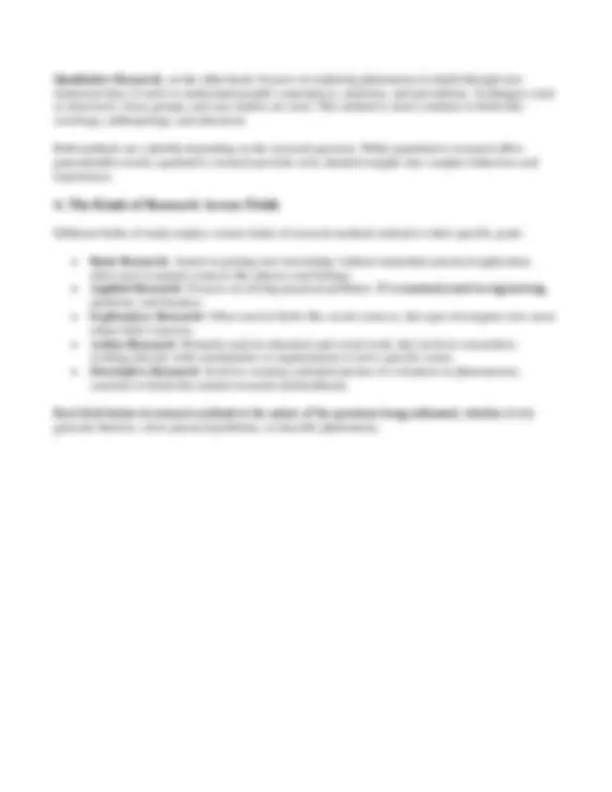



Study with the several resources on Docsity

Earn points by helping other students or get them with a premium plan


Prepare for your exams
Study with the several resources on Docsity

Earn points to download
Earn points by helping other students or get them with a premium plan
Community
Ask the community for help and clear up your study doubts
Discover the best universities in your country according to Docsity users
Free resources
Download our free guides on studying techniques, anxiety management strategies, and thesis advice from Docsity tutors
Inquiry and research are both systematic processes that aim to expand knowledge, but they serve different purposes and follow distinct approaches. Understanding the nature of inquiry and research involves recognizing the broader goals, methods, and contexts in which they occur. Here’s an in-depth explanation of both:
Typology: Thesis
1 / 2

This page cannot be seen from the preview
Don't miss anything!


Research is essential in daily life because it empowers individuals to make informed decisions. By seeking out reliable information, people can evaluate options, solve problems, and learn more about the world around them. For example, when choosing a product, research into reviews and specifications can help avoid purchasing a poor-quality item. Similarly, research in health or diet can guide personal decisions for better well-being. In everyday scenarios, such as managing finances or planning vacations, research ensures that decisions are grounded in facts rather than assumptions. Research also fosters critical thinking, allowing individuals to assess different viewpoints and make thoughtful, reasoned conclusions.
Characteristics of Research : Research is systematic, objective, and often empirical. It seeks to answer questions or solve problems through structured methods. It involves thorough investigation, evidence gathering, and analysis to contribute new knowledge or verify existing facts. Processes of Research : The research process typically includes the following steps: Identifying a Problem : Formulate a clear research question or hypothesis. Literature Review : Conduct a review of existing research to understand the context and gaps. Research Design : Choose appropriate methodologies (qualitative, quantitative, etc.). Data Collection : Gather data through experiments, surveys, interviews, etc. Data Analysis : Interpret the data and draw conclusions. Reporting Results : Present findings in a clear and organized format. Ethics of Research : Ethical research practices are essential to maintaining integrity and trust in the research process. Ethical guidelines include: Informed Consent : Ensuring participants know and agree to the research terms. Confidentiality : Protecting personal information of research subjects. Objectivity : Avoiding bias in research methods and analysis. Honesty : Reporting findings truthfully without falsifying data.
Quantitative Research involves the collection and analysis of numerical data. It is often used to identify patterns, test hypotheses, or establish statistical significance. This type of research employs tools like surveys, experiments, and statistical tests. It's commonly used in fields like economics, psychology, and health sciences.
Qualitative Research , on the other hand, focuses on exploring phenomena in-depth through non- numerical data. It seeks to understand people's experiences, emotions, and perceptions. Techniques such as interviews, focus groups, and case studies are used. This method is more common in fields like sociology, anthropology, and education. Both methods are valuable depending on the research question. While quantitative research offers generalizable results, qualitative research provides rich, detailed insights into complex behaviors and experiences.
Different fields of study employ various kinds of research methods tailored to their specific goals: Basic Research : Aimed at gaining new knowledge without immediate practical application, often seen in natural sciences like physics and biology. Applied Research : Focuses on solving practical problems. It’s commonly used in engineering, medicine, and business. Exploratory Research : Often used in fields like social sciences, this type investigates new areas where little is known. Action Research : Primarily used in education and social work, this involves researchers working directly with communities or organizations to solve specific issues. Descriptive Research : Involves creating a detailed picture of a situation or phenomenon, common in fields like market research and healthcare. Each field tailors its research methods to the nature of the questions being addressed, whether it’s to generate theories, solve practical problems, or describe phenomena.